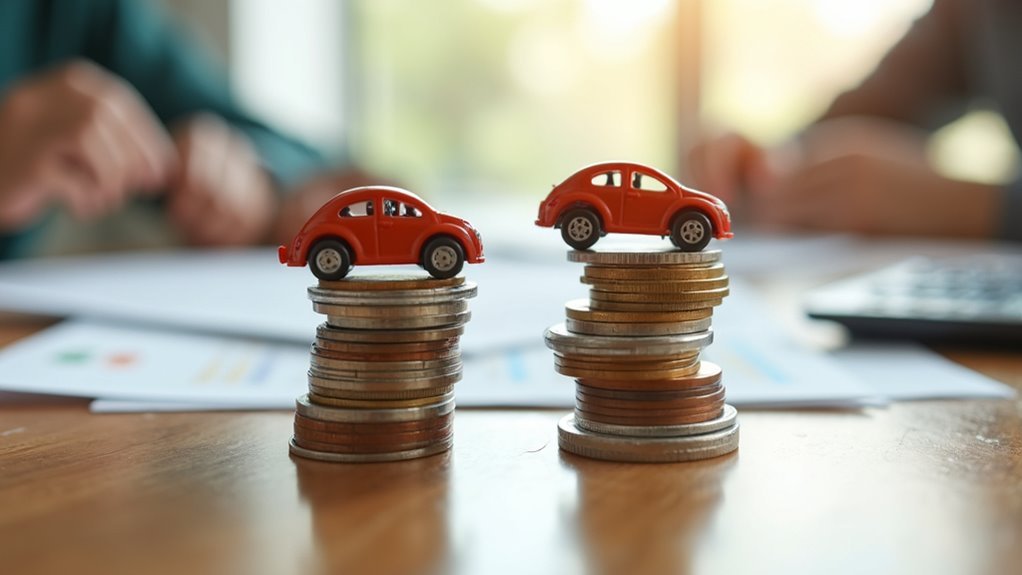


Deciding between a fixed-rate and a variable-rate car loan can feel overwhelming. Both options have pros and cons. Many buyers worry about making the right choice for their budget and future.
Picking the wrong type of loan can lead to unexpected costs or stress. You might end up paying more than you planned or feel uneasy about changing payment amounts. This uncertainty can make car buying stressful and confusing.
The best option depends on your need for stability versus your willingness to take risks for possible savings. Understanding how each loan type affects your payments and total cost will help you choose wisely. This blog will guide you to the right car loan for your needs.

Auto Loan Credit Score & Reports
A fixed-rate car loan has one interest rate that does not change during the loan. Your monthly payments stay the same. This makes it easier to plan your budget. If you keep your car for the full loan term, fixed rates are helpful. You may want to refinance if interest rates drop. Refinancing can lower your rate but may affect your credit score. Lenders check your credit when you refinance.
Most people choose fixed-rate loans for their predictability. Because fixed-rate loans offer payment predictability, they help you avoid unexpected increases in your monthly costs even if market rates rise. If you understand fixed-rate loans, you can avoid surprises with your payments. For those interested in additional financial security, learning about options like a credit freeze can help protect your credit when applying or refinancing.
Variable-rate car loans have interest rates that can change over time. The rate follows a benchmark set by banks or lenders. If the benchmark goes up, your interest rate and monthly payment can rise. If the benchmark drops, your payment could go down. This means your total loan cost may change during the loan term. You should plan for possible payment changes.
Variable rates were used in about 15% of auto loans in 2023, says Experian. If you prefer stable payments, a fixed-rate loan may be better. Always consider your budget before choosing a variable-rate loan. It’s also important to know that multiple hard inquiries on your credit report from applying for car loans in a short timeframe can lower your credit score, so grouping applications together can help minimize the impact. Regularly monitoring your credit can help you track any effects from loan applications and keep you informed about changes to your credit health.

Fixed rates and variable rates are different in how they affect your car loan payments. Fixed-rate loans keep the same interest rate the whole time. This means your monthly payments never change. It is easier to plan your budget with this option. Variable-rate loans have interest rates that can go up or down. These changes depend on the market and a benchmark rate. If rates go up, your payments might increase. If rates go down, your payments could get smaller.
Your credit score and down payment affect the rates you get. Higher credit scores and bigger down payments often mean better rates. If you want steady payments, choose a fixed rate. If you are comfortable with changing payments, consider a variable rate. Lenders often look at your payment history when deciding what rates to offer, so making on-time payments can help you qualify for better options. You can also use personalized match recommendations to help identify which loan type best fits your specific financial profile and goals.
A fixed-rate car loan gives you a set interest rate for the whole loan term. Monthly payments stay the same, which makes budgeting easy. If interest rates increase in the market, your payments do not change. This protects you from unexpected costs. If rates drop, you can choose to refinance at a lower rate. Lenders may offer better terms for fixed-rate loans.
Fixed rates give you financial stability and peace of mind. Additionally, choosing a fixed-rate loan means you do not have to worry about changes in credit monitoring requirements affecting your monthly payment amount. With fixed-rate loans, you also don’t have to track the expiration of fraud alerts, which can be necessary with some variable-rate or risk-based products.

Check Your Credit Scores & Reports
With a fixed-rate car loan, you might face higher starting interest rates compared to variable options. If market rates drop during your loan term, you won’t benefit from lower monthly payments. This structure can limit your flexibility and powerful savings over time.
Additionally, if you need to refinance or pay off your loan early, you could encounter early payment penalties, which can add to the overall cost of your car loan. Some lenders may also charge origination fees at the start of the loan, further increasing your upfront expenses.
Fixed-rate car loans usually start with higher interest rates than variable-rate loans. Lenders set these rates to protect against market changes. Higher initial rates mean you pay more each month at first. If you choose a fixed rate, your total interest may be higher over time.
Larger payments can make it harder to manage your budget. Insurance costs can add extra pressure on your finances. Fixed rates also offer less room for negotiation. If you compare all costs, you can choose the best loan for your needs.
Fixed-rate car loans do not adjust when market rates fall. You will not get a lower payment automatically. If interest rates drop, new borrowers might pay less than you. You can only benefit from lower rates if you refinance your loan. Refinancing may require new paperwork and extra fees. You must also qualify for the new loan. Below is a comparison:
| Market Condition | Fixed-Rate Loan |
|---|---|
| Rates Rise | Your rate stays the same |
| Rates Drop | No automatic savings |
| Refinancing Needed | Yes, to get lower rate |
| Extra Costs Possible | Yes, during refinance |
A fixed-rate loan protects you from rate increases. However, you need to refinance to gain from lower rates.
Variable-rate car loans can save you money if interest rates go down. These loans usually have lower starting interest rates than fixed-rate loans. If market rates drop, your monthly payments may also drop. You might pay less total interest if rates stay low. You can often refinance if better rates appear.
These benefits make variable-rate loans a good choice if you watch interest rates closely. Choosing a variable-rate loan may also positively affect your credit mix by adding diversity to your credit profile, as lenders value a combination of installment and revolving credit types. Building a diverse credit profile can support your long-term financial stability and improve your overall borrowing options.

Variable-rate car loans can cost more because rates may rise over time. These loans have changing interest rates, so your monthly payment can go up if rates increase. This makes it harder to stick to a budget and plan for future payments. Lenders may start with lower rates, but these can increase and erase early savings. If you want a stable payment, a variable-rate loan may not be the best choice. Consider these drawbacks:
| Drawback | Impact on Borrower |
|---|---|
| Interest rate changes | Higher total loan costs |
| Payment unpredictability | Difficult budgeting |
| Borrower risk | Possible financial stress |
| Rising rates | Lower long-term savings |
| Lender control | Less clarity for borrowers |
If you understand these risks, you can make a better loan decision. It’s also important to compare the APR vs. interest rate when evaluating variable-rate loans, as the true cost can be higher than it first appears. Reviewing your credit reports regularly can help you catch errors or unauthorized activity that could affect your loan eligibility and the rates you’re offered.
Changes in the economy can affect your car loan costs. Market interest rates have a direct impact on what you pay over time. If you have a variable-rate loan, your monthly payment can go up or down when rates change. A fixed-rate loan keeps your payment steady, even if rates rise. Good credit usually helps you get lower rates from lenders. If dealerships offer incentives, you might pay less despite higher rates.
However, these special deals are not always available. Lenders may adjust their offers based on the overall economy. Your loan costs often depend on these economic trends. It’s similar to coverage limits and deductibles in car insurance, where changes in the market or your personal circumstances can affect your overall financial responsibility.

Fixed-rate car loans make monthly payments predictable. You always know the exact amount you need to pay each month. This makes it easier to plan your budget for the entire loan term. If you want steady payments, a fixed rate is often best. Variable-rate loans can change with the market. Your monthly payment might go up or down over time. If rates rise, your payments could unexpectedly increase.
This can make it harder to manage your finances. If you need to keep your budget steady, fixed-rate loans offer more security. Predictable payments also help you compare leasing deals or dealership offers with confidence. If you expect changes in income or expenses, consider how payment changes could affect you. Reliable payments lower the risk of surprises in your budget.
Fixed-rate and variable-rate car loans affect your total loan cost differently. Fixed-rate loans keep your monthly payments the same. You always know how much interest you will pay. Variable-rate loans have payments that can change. If interest rates go up, your payments and total cost increase. If rates go down, you may pay less interest. Variable-rate loans sometimes start with lower rates. Refinancing the loan later can help manage your costs.
A fixed-rate loan is a good choice if you want steady monthly payments. This loan keeps your payment amount the same each month. It protects you from future interest rate increases. People with good credit often get lower fixed rates.
Fixed-rate loans also make it easier to plan your budget. If you dislike surprises or changing payments, you should consider this option. Fixed rates shield you from economic changes that could raise your costs. If you want payment certainty, a fixed-rate loan may fit your needs.
A variable-rate loan may help if you expect interest rates to stay the same or go down. This loan can save you money at first. People who plan to pay off their loan early may benefit. You may also benefit if you expect to sell or trade in your car soon.
Some people like this option if they are comfortable with payment changes. If you have strong credit and good insurance, you may handle payment changes better. This loan is good if you are able to manage a changing budget. Consider this loan if you want to upgrade your car soon or plan to refinance.
Before you pick between fixed and variable rates, assess your financial stability, the length of your loan term, and where interest rates are headed. Data shows that borrowers with stable incomes and shorter loan terms often manage risk better, while fluctuating markets can impact variable-rate payments significantly. By weighing these factors, you’ll make a more informed choice that fits your budget and goals.
Personal financial stability affects your choice between fixed-rate and variable-rate car loans. If you have a high credit score and a large down payment, you may get better loan terms. Lenders use your credit score and down payment to set your rate. If your finances are steady, a variable-rate loan might be less risky. If your income is unstable, a fixed-rate loan gives predictable payments. You should check these factors:
If you review these points, you can choose a loan that fits your needs.
Loan term length affects your monthly payments and total interest. A longer term lowers monthly payments but increases total interest paid. Fixed-rate loans keep payments steady over time. Variable-rate loans can change your payment amount if rates go up or down. You should compare how different terms fit your budget and goals.
| Loan Term Length | Emotional Impact |
|---|---|
| Shorter (36 mo.) | Relief: Debt paid off quickly |
| Medium (48 mo.) | Balance: Easier to handle payments |
| Longer (72 mo.) | Worry: Pay more interest overall |
Market interest trends affect whether a fixed or variable car loan is better for you. Interest rates change with the economy. Fixed rates are safer if rates may rise soon. Variable rates could save money if rates are likely to drop. Credit scores and down payments also affect the rate you get. Checking the market helps you make a smart choice.
You can get the best car loan deal by preparing before you apply. First, check your credit score. A score above 700 usually gets you lower interest rates. If your score is lower, expect higher rates. Explore financing options beyond the dealership.
Credit unions and online lenders can offer better deals. Always compare annual percentage rates from different lenders. Ask about dealer promotions, as some can save you money. Negotiate the car price and the loan terms separately. If you make a bigger down payment, your loan amount and monthly payments will be lower.
If you want stability, a fixed-rate car loan can offer predictable payments. If interest rates rise, a fixed rate protects your budget. You may pay a little more at first, but you avoid future surprises.
If you are comfortable with some risk, a variable-rate loan might save money when rates are low. However, if rates increase, your monthly payments could go up. Always compare both options and think about your financial plans.
If you need help tracking your loan payments, use a Finance Monitoring Guide. This tool helps you stay organized and make smart money choices. Consider your goals and use the guide to keep your finances on track.
Understanding what influences your credit score makes it much easier to interpret credit checks. Discover more insights and tips at the Finance Monitoring Guide.
(+1) 5165229807
info@financemonitoringguide.com
500 Marquette Ave NW, Suite 1200 Albuquerque, NM 87102 United States